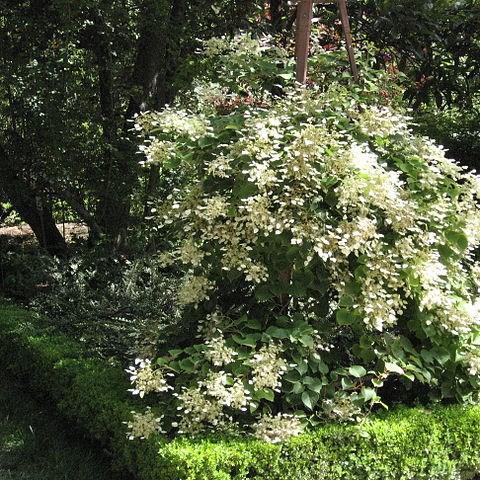
Schizophragma hydrangeoides
Japanese hydrangea vine
Schizophragma hydrangeoides - the Japanese hydrangea vine - is a climber that uses aerial roots to climb, and is slow growing. It needs a strong frame to support its weight. It has dark green oval leaves that turn yellow in Autumn, and in Summer has large clusters of honey-scented creamy-white flowers.
-
Full sun to partial shade
-
Occasional watering
-
Full Frost Hardy: 5F (-15°C)
-
Moist and free draining
Common name
Japanese hydrangea vine
Latin name
Schizophragma hydrangeoides
type
Climber
family
Hydrangeaceae
ph
5.6 - 7.9 Acid - Neutral
Plant & bloom calendar
-
Best time to plant
-
When the plant will bloom
full grown dimensions
 4.00 M
6.00 M
4.00 M
6.00 M
Schizophragma hydrangeoides
Schizophragma hydrangeoides - the Japanese hydrangea vine - is a climber that uses aerial roots to climb, and is slow growing. It needs a strong frame to support its weight. It has dark green oval leaves that turn yellow in Autumn, and in Summer has large clusters of honey-scented creamy-white flowers.
Planting Season
From Mid Spring TO Late Spring
Planting Season
Propagation by Layering
From Mid Autumn TO Late Autumn
Propagation can be done by layering, choose soft pliable stems that will reach the ground and allow the end of the shoot to be about a 1ft above the ground. On either side of a leaf joint, carefully slice the bark along it before securing it into the ground with wire hooks or similar each side of the slice. a hormone rooting powder can be used to help with the rooting. Tie the end of the shoot up carefully so that it grows vertically.
Propagation by Semi Hardwood Cuttings
From Late Spring TO Early Summer
Semi hard wood cuttings are taken from the current years growth from late summer to mid autumn the bottom of the cuttings is hard and soft on the top. With a sharp knife take a cutting of about 14 cms, remove lowest leaves, dip end into rooting hormone, and place round the edge of a pot filled with a suitable compost, water well, they must remain moist till rooted, place under glass but in semi shade.
Flowering
From Mid Summer TO Late Summer
Cream-coloured flowers similar to lace-cap hydrangeas appear in mid Summer













